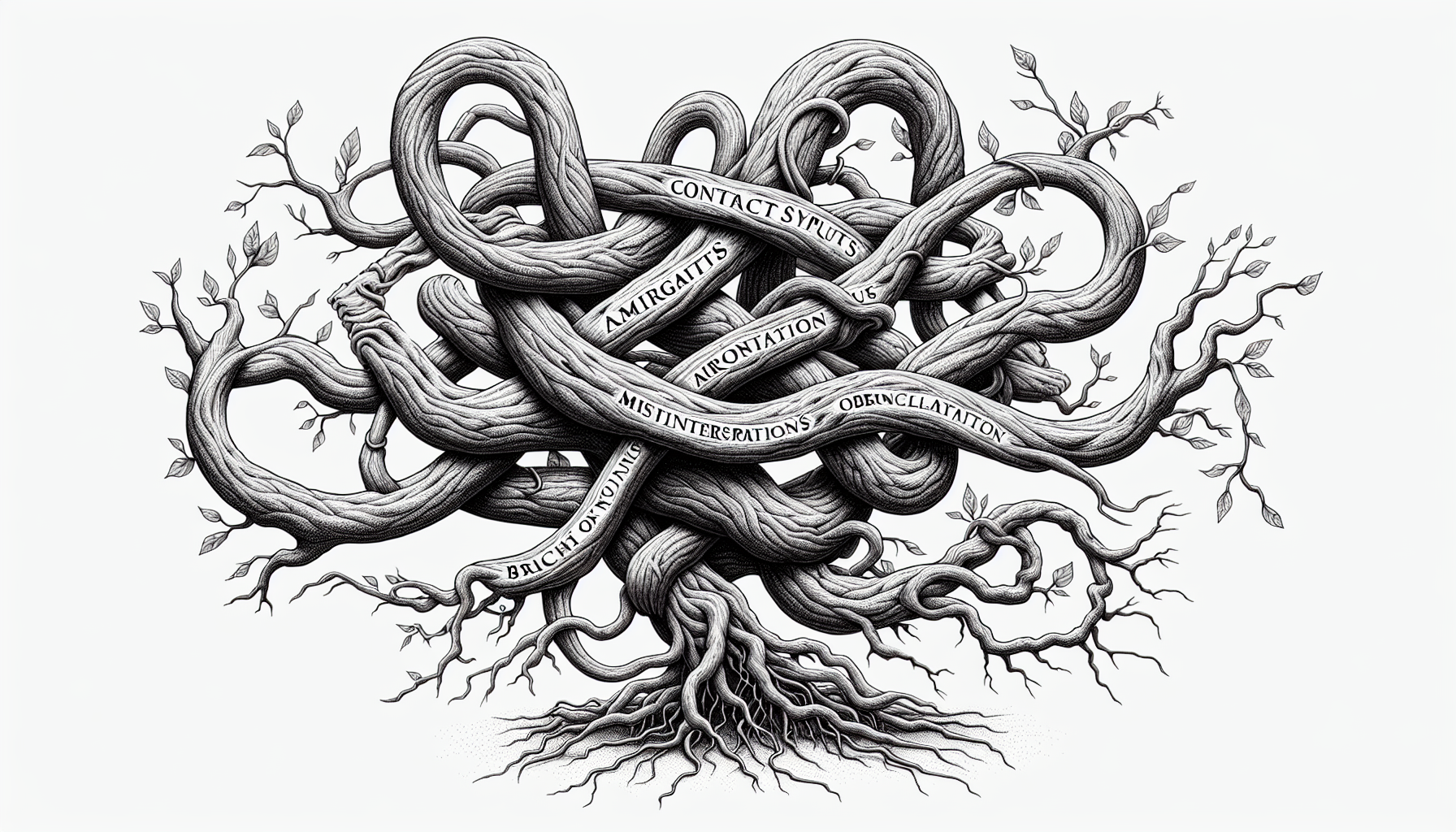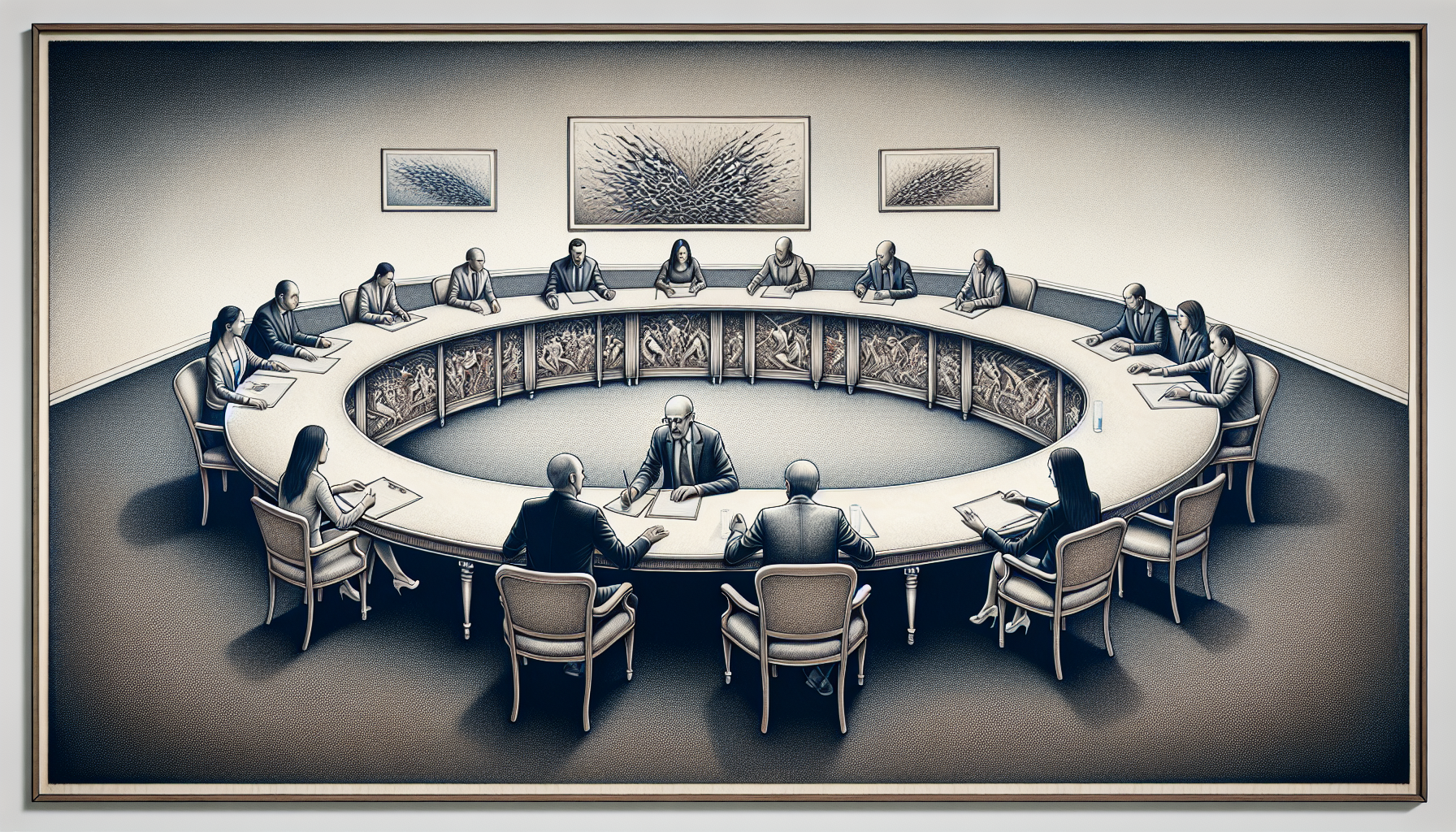Malcolm ZoppiWed May 08 2024
Mastering Commercial Contract Dispute Resolution: Strategies and Tips
What is a commercial contract dispute and how can it affect your business? This article cuts through the complexity, offering a clear understanding of why contract disputes occur, their repercussions on business operations, and practical advice on resolving them. Complete with strategies to avoid common pitfalls and legal expertise to steer negotiations, we provide the […]
What is a commercial contract dispute and how can it affect your business? This article cuts through the complexity, offering a clear understanding of why contract disputes occur, their repercussions on business operations, and practical advice on resolving them. Complete with strategies to avoid common pitfalls and legal expertise to steer negotiations, we provide the insights needed to navigate the choppy waters of contract conflicts, and protect your commercial interests.
Key Takeaways
Commercial contract disputes can significantly disrupt business operations, but with the help of experienced legal counsel such as contract dispute solicitors, these situations could be managed effectively to maintain working relationships and potentially uncover new opportunities.
Constructing well-defined contracts with explicit terms and effective dispute resolution clauses is pivotal, as they act as a deterrent to potential disputes and provide clarity in resolutions, minimizing misunderstandings and legal intervention.
Alternative dispute resolution methods like mediation and arbitration offer cost-effective and relationship-preserving solutions compared to litigation; however, if litigation is unavoidable, having thorough legal representation and conducting a cost-benefit analysis are crucial to the process.
Navigating the Waters of Commercial Contract Disputes

In the business sphere, commercial contract disputes often sit at the core of numerous challenges faced by enterprises. Disagreements between essential parties over contractual terms can impede progress on projects, strain work relations, and exhaust financial and human resources. When handled with care and guided by experienced professionals like contract dispute solicitors or commercial contract lawyers specializing in litigation, these contentious issues have the potential to become manageable situations that might lead to reinforced partnerships or reveal opportunities within commercial litigation.
This analysis will delve into various aspects of such disputes as well as their profound effects on businesses’ operations.
Defining Commercial Contract Dispute
Imagine a situation where two parties are deadlocked due to differing interpretations of the provisions within a contract. This forms the essence of a dispute over a commercial contract, with disputes covering an array that includes matters from agency and distribution relationships to financial commitments and service contracts.
Typically, these disagreements revolve around allegations of breach of contract — instances in which one party does not live up to their contractual obligations. It’s important to note that breaches can vary in impact. Some might be minor and do not greatly impede the purpose of the contract, resulting in lesser repercussions.
The Impact on Business Dynamics
Disagreements over contracts can significantly impact a company, potentially leading to:
Impediments in the progress of projects
Disruption across tasks and timelines that rely on one another
Tensions within business partnerships
Jeopardizing ongoing alliances and the prospect of future joint ventures
The resources and time required to settle such disputes underscore the need for prompt and efficient solutions. Without these, operations within the business could face considerable disruptions.
Identifying the Roots of Contractual Issues

Delving into the intricacies of contractual disputes often uncovers typical underlying causes: unclear language, misunderstandings in meaning, and failures to meet commitments. These elements can evolve an agreement that once appeared robust into a contentious field where parties assert their legal rights and demands. Disputes over contracts emerge due to modifications in contract terms, financial confusions or unforeseen incidents which challenge the limits of clauses related to acts of God.
Possessing a thorough understanding of these fundamental reasons positions companies more favorably for avoiding and managing potential disputes effectively.
Ambiguities and Misinterpretations
Ambiguities in contract language often lead to disputes because they allow for multiple interpretations and can result in misunderstandings. Such uncertainties may grow serious enough to require legal resolution to clarify the actual intent of the contractual terms.
At times, imprecise wording might inadvertently commit parties to conditions that they didn’t anticipate, which could cause unintended breaches of the contract.
Breach of Contract: When Obligations Aren’t Met
A breach of contract occurs when there is a distinct violation of the agreement’s terms, falling into two categories: material or minor. While both are serious, a material breach severely disrupts the fundamental intention behind the contract and its fulfillment. Conversely, a minor breach may still impact performance but doesn’t drastically alter it.
In situations where ambiguous language in contracts leads to unforeseen financial obligations, significant detriment can ensue for those involved. Should such a breach take place, gathering proof becomes crucial for supporting one’s position – this includes collecting relevant contractual documents, financial records and obtaining statements from witnesses.
Crafting Ironclad Contracts to Prevent Future Disputes

In the context of a business relationship, it is crucial to forge solid contracts that can preemptively mitigate any future disputes. Such agreements, equipped with unambiguous terms and exact wording, act as defenses against possible misinterpretations and assertions. Ensuring that these contracts detail specific duties for all involved parties while also allowing for adjustments aligned with business evolution and strategic changes can make them enduring instruments that accommodate change over time.
When there is an existing contract between parties, it’s imperative to include provisions within the document specifying the applicable legal framework and jurisdictional authority. This establishes a definitive approach to addressing disputes if they occur.
Importance of Clarity and Precision
The intricacies of the English language underscore the necessity for crafting contracts with clarity and precision. Establishing formal agreements via legally binding contracts wards off the complications that often arise from informal deals, reinforcing stances during disputes. These contracts must:
Explicitly detail procedures for handling disputes
State clearly which laws and jurisdictions are to be applied
Foresee potential disputes and minimize expenses by offering explicit legal frameworks.
Nevertheless, past interactions and behavior among parties may inadvertently suggest unintended terms, thereby introducing possible ambiguities into a contract.
Incorporating Effective Dispute Resolution Clauses
An effectively formulated contract contains precise clauses for dispute resolution, providing a structured approach to handle disagreements. These stipulations outline particular mechanisms like arbitration or mediation that can expedite the process toward resolving conflicts and frequently result in faster, more cost-efficient results. Included such clauses has the potential to substantially diminish both time and expenditure needed to resolve disputes.
Alternative Paths to Settling Contract Disputes

When faced with the challenging waters of contract disputes, alternative dispute resolution (ADR) serves as a vital lifeline. ADR offers a range of advantages compared to conventional litigation, notably in terms of reducing expenses and safeguarding business relationships. Mediation and arbitration stand out for their capacity to efficiently and effectively settle disputes.
Such methods provide parties involved in a contract dispute the opportunity to find resolution outside the strict confines of judicial proceedings, allowing them to customize the solution according to their unique requirements and situations.
Mediation: A Collaborative Approach
Mediation is a valuable option for individuals looking to peacefully resolve their contract disputes. It involves guiding the disputing parties through conversations, facilitated by an impartial mediator, with the goal of achieving a non-legally binding agreement that satisfies all those involved. The task of the mediator includes steering discussions and occasionally offering assessments to assist in identifying areas where common ground can be found.
At its core, mediation emphasizes comprehension and emphasis on what each party considers important, creating a cooperative atmosphere that encourages reaching an agreeable resolution beneficial to everyone concerned.
Arbitration: Binding Decisions Outside Court
In commercial contracts, designating arbitration as the chosen method for dispute resolution can circumvent the necessity of engaging in court proceedings. This approach not only prevents potential judicial involvement, but also offers a structured and formal mechanism similar to a court’s decision-making process.
Arbitration stands out as an alternative that is both time-efficient and cost-effective when compared to conventional courtroom litigation. In this setting, an arbitrator makes a conclusive determination on the matter at hand, resulting in finality which often brings comfort to the parties involved in the dispute.
When Litigation Becomes Inevitable

Alternative dispute resolution serves as a precursor to litigation, only pursued when all other methods of resolving disputes fail to yield results. This route necessitates adherence to stringent pre-action procedures and judicial schedules by the involved parties, designed to synchronize their actions in advancing the case.
When it becomes inevitable, skilled litigators become vital assets. They bring strategic advice and expertise that is essential for steering the dispute toward a favorable outcome.
Preparing for High Court Proceedings
Engaging with High Court proceedings necessitates:
The meticulous preparation of legal paperwork
Strict adherence to predetermined deadlines
Deliberate scheduling for appearances in court
Compliance with the High Court’s specific timelines and cut-off dates
Ensuring that all evidence is presented according to Civil Procedure Rules requirements
Compilation of witness statements, alongside potential expert testimonies as needed
Expectation for witnesses to be available for thorough cross-examination during the trial.
This process can be likened to embarking on a journey through unfamiliar legal territories, eventually leading up to a decisive final ruling.
Should there be disputes over facts, this paves the way for a full trial. Conversely, an undisputed case may lead directly to summary judgment. During disclosure phases where relevant documents are exchanged, it often happens that settlements occur—sometimes these resolutions manifest soon after disclosure concludes.
Legal Representation and Advocacy
When disputes over a contract lead to litigation, the presence of skilled legal counsel becomes paramount. Attorneys with expertise in commercial law are invaluable for their ability to prepare vital documents, steer through intricate procedures, and forcefully represent their clients’ positions before the court.
In circumstances where allegations of breach arise or when disputes arise around contractual obligations, securing early legal guidance is essential in crafting a robust strategy for defense. Clients should proactively seek legal advice to safeguard against potential breach of contract claims and navigate any ensuing disputes effectively.
Strategic Considerations in Resolving Commercial Disputes
Effectively navigating commercial disputes demands astute analytical skills, comprehensive legal understanding, and the engagement of seasoned legal professionals. This involves a thorough scrutiny of the facts at hand, decoding the contract terms involved, and applying relevant legal principles to identify both strong points and vulnerabilities in any given case.
Formulating a resolution strategy should be tailored specifically to meet the client’s business objectives. Before initiating any method for resolving disputes, it is critical that one meticulously evaluates its financial consequences.
Evaluating the Strength of Your Case
To ensure a solid legal stance.
One must assess their case’s merit from the start by collecting evidence and thoroughly grasping the nature of the dispute.
Reflect on the adversary’s financial situation to ascertain whether they have adequate funds to fulfill a judgment debt.
Ascertain that your claim is strong enough to recoup most of the incurred legal expenses.
Utilize an experienced legal team’s knowledge for courtroom tactics and managing bargaining discussions—such proficiency can steer you towards either success or defeat.
Cost-Benefit Analysis of Pursuing Litigation
Commencing litigation should be a considered decision, one that necessitates a thorough examination of the benefits versus the direct expenses of legal fees and related costs. It is important to account for indirect costs like operational disruptions and time taken away from business functions in this assessment.
Gaffney Zoppi’s Expertise in Contract Law
Navigating the intricate waters of commercial contract law calls for an experienced guide, and Gaffney Zoppi’s team of legal experts is prepared to steer clients through even the most turbulent legal challenges. They specialize in designing contracts that not only reduce risk but also encourage business expansion by adhering to stringent standards.
With a keen eye on evolving industry norms and regulations, Gaffney Zoppi delivers up-to-date and impactful strategies to their clientele. At every stage, from early indications of a potential breach to settling disputes, their focus lies in constructing robust cases aimed at achieving swift and economical resolutions.
Tailored Legal Solutions for Diverse Clients
The attorneys at Gaffney Zoppi extend their expertise to an extensive array of clients, including both small business owners and major corporate entities. They possess a comprehensive grasp of contract law, ensuring they can deliver the myriad legal services their clientele requires.
Contracts crafted by the team at Gaffney Zoppi are tailored to meet the specific objectives and hurdles faced by each client. This meticulous approach is part of their commitment to constructing robust legal agreements that act as strong defenses in warding off future conflicts.
Transparent Pricing and Efficient Turnaround
Gaffney Zoppi excels in the domain of contract law, standing out with their legal expertise as well as their adherence to clear pricing and prompt service delivery. Acknowledging the critical nature of time in legal matters, they guarantee rapid responses to client inquiries, making sure that clients are never left without support when urgent needs arise.
The firm’s commitment to affordability and transparency is evident in its fixed fee system for legal services. This approach enables companies to plan their financial outlays on legal matters with confidence, secure in the knowledge that there will be no surprises charges.
Summary
Navigating through the intricate waters of commercial contract disputes underscores the critical need for clear contracts, the efficacy of alternative dispute resolution methods, and the crucial role that seasoned legal advice plays. Recognizing the underlying causes of contractual issues is essential in forming robust agreements and managing situations effectively when disputes surface. To safeguard business interests, it’s not about evading challenges but strategically planning with insights gained from past experiences. Allow Gaffney Zoppi’s expertise to guide you in these matters like a trusted compass.
Frequently Asked Questions
What types of contract law services does Gaffney Zoppi provide?
Gaffney Zoppi offers an extensive array of services within the realm of contract law, including the creation and examination of contracts, counsel regarding issues related to breach of contract, as well as assisting clients with resolution efforts when disputes arise.
How does Gaffney Zoppi tailor contracts to individual business needs?
Gaffney Zoppi tailors contracts to individual business needs by investing time to understand each client’s business, goals, and challenges, ensuring meticulous crafting to address specific needs and promote legal security and business prosperity.
What are the benefits of alternative dispute resolution over litigation?
Alternative dispute resolution offers numerous advantages for businesses seeking to settle disputes, including being more cost-effective and time-saving compared to litigation. It helps in maintaining business relationships by providing a more amicable way to resolve conflicts.
What factors should be considered when evaluating the strength of a case?
When assessing the robustness of a case, it is important to take into account several crucial factors that could greatly influence its resolution. These include the explicitness of the contract wording, accessibility of evidence, financial standing of the opposing party, and chances for recuperation of legal expenses. Each element can have a substantial effect on how the case unfolds.
Are the fees for Gaffney Zoppi’s services fixed or variable?
Gaffney Zoppi has established fixed fees for their services, maintaining affordability and transparency for their clients.